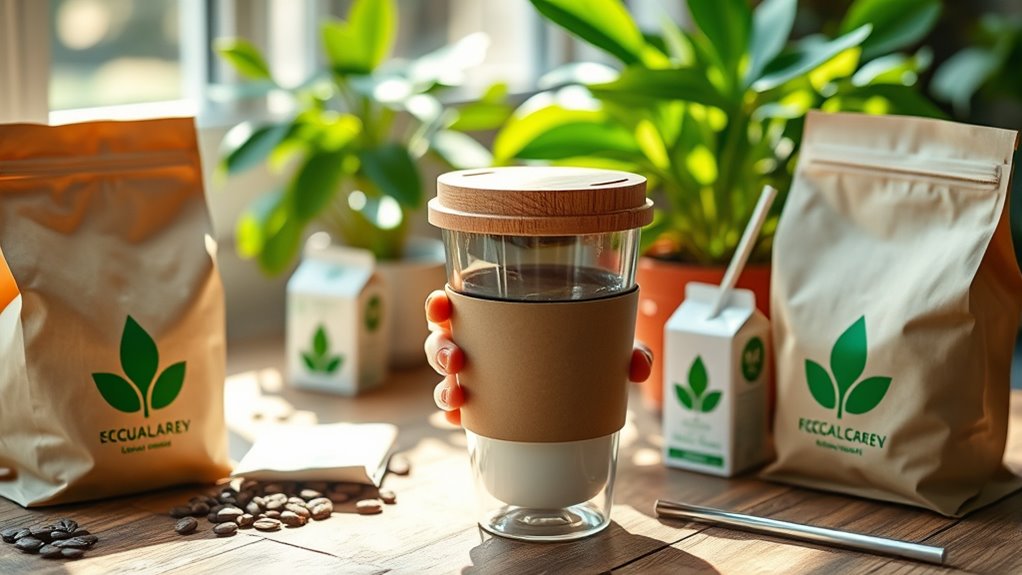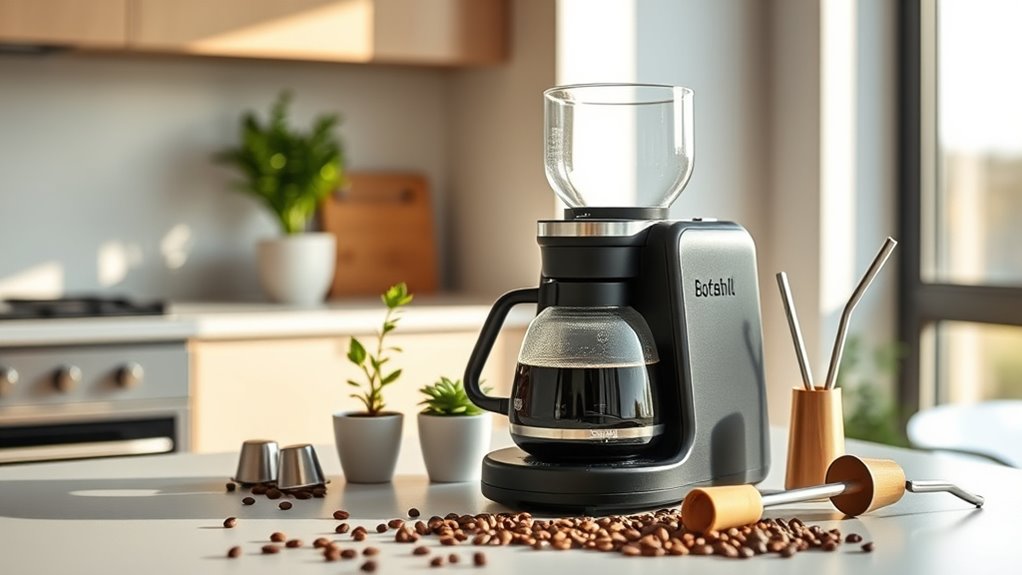To make your coffee habit more sustainable today, choose eco-friendly beans from brands supporting ethical practices like Fair Trade and Organic certifications. Use a reusable mug or travel container and opt for energy-efficient brewing methods. Support sustainable farms, compost coffee grounds, and donate excess supplies to community organizations. Educate yourself on ethical sourcing, and invest in durable coffee gear to reduce waste. Keep exploring simple ways to strengthen your eco-conscious coffee routine—more tips await.
Key Takeaways
- Choose coffee brands that support ethical sourcing, organic farming, and fair trade certifications.
- Use reusable cups, filters, and utensils to minimize single-use waste and support eco-friendly packaging.
- Brew with energy-efficient methods like AeroPress or pour-over, and keep equipment well-maintained for sustainability.
- Support local charities by donating surplus coffee or supplies to benefit communities and reduce waste.
- Educate yourself and others on sustainable coffee practices to promote responsible consumption and environmental awareness.
Choose Eco-Friendly Coffee Beans and Packaging

Choosing eco-friendly coffee beans and packaging is a simple yet impactful way to make your coffee habit more sustainable. Start by checking how your coffee is sourced. Look for brands that prioritize ethical coffee bean sourcing, supporting farmers who use sustainable practices and avoid harmful chemicals. This guarantees your coffee is grown responsibly, reducing environmental impact. Additionally, opt for eco-friendly packaging, such as beans in biodegradable or recyclable bags. These materials help minimize plastic waste and prevent pollution. Supporting companies committed to sustainable practices encourages a greener supply chain. Furthermore, choosing Mad Tasting options can provide you with unique, flavorful, and environmentally conscious coffee experiences. Incorporating sustainable farming methods into your choices can further enhance the eco-friendliness of your coffee. Considering certifications like Fair Trade or Organic can also ensure your coffee aligns with ethical and eco-friendly standards. Being aware of environmentally friendly practices across the supply chain can help you make more informed choices. By making mindful choices about coffee bean sourcing and packaging, you reduce your carbon footprint and promote environmental responsibility in your daily routine. Small changes like these add up, making your coffee experience more eco-conscious and environmentally friendly.
Use a Reusable Coffee Cup or Travel Mug

Using a reusable coffee cup or travel mug helps cut down on single-use waste and keeps your coffee hot longer. Plus, there are stylish and eco-friendly options to match your personality. Making this small change can substantially boost the sustainability of your coffee routine. Additionally, using a designated mug can reduce the need for disposable cups that often contain single-use plastics. Incorporating environmentally friendly materials into your choice of mug can further lessen your ecological footprint and promote sustainability. Selecting mugs made from durable and biodegradable materials ensures that your eco-friendly habits have a lasting positive impact, supporting the broader goal of green living and reducing environmental harm.
Reduces Single-Use Waste
Switching to a reusable coffee cup or travel mug is one of the simplest ways to cut down on single-use waste. By doing so, you reduce the number of disposable cups heading to landfills every day. To maximize your impact, consider these ideas:
- Use reusable filters for brewing, cutting down on waste from paper filters.
- Opt for coffee beans packaged in biodegradable packaging to lessen environmental harm.
- Bring your own utensils and containers when ordering specialty drinks or snacks.
- Choose natural materials like bamboo or stainless steel for your reusable items, which are more durable and eco-friendly.
- Supporting eco-friendly practices in coffee shops can further promote sustainability and reduce overall environmental impact.
- Being aware of Advanced Techniques related to eco-conscious habits can help you stay informed about new sustainable options and innovations.
- Incorporating relationship-building principles, such as open communication and shared goals, can enhance your motivation to maintain eco-friendly habits.
- Educating yourself about sustainable materials and their benefits can help you make better choices and inspire others to do the same.
These small changes help prevent waste from becoming trash and encourage more sustainable habits. Every time you choose a reusable mug, you’re not only reducing waste but also supporting eco-friendly practices in coffee shops. Making these adjustments keeps your coffee routine greener and more responsible.
Keeps Coffee Hot Longer
A reusable coffee cup or travel mug can keep your coffee hot for much longer than disposable cups. Insulation techniques, like double-walled construction, trap heat and reduce temperature loss. Using mug warmers can also maintain your coffee’s temperature during extended periods. To maximize heat retention, choose a mug with a tight-fitting lid and pre-warm your container before pouring in your brew. These simple steps ensure your coffee stays hot without needing to reheat repeatedly. By investing in quality insulation and utilizing mug warmers, you reduce waste from reheating and keep your coffee at the perfect temperature longer. Proper water quality can also influence the taste and temperature retention of your brew. Additionally, selecting a mug made from insulating materials enhances heat retention and durability, making your coffee experience more sustainable. For best results, consider using sustainable materials that minimize environmental impact and support eco-friendly practices. Understanding data management methods, like double-walled insulation, can help optimize heat retention in your coffee mug. Moreover, choosing mugs with manufacturing standards ensures safety and longevity for eco-conscious consumers. Here’s a quick comparison:
| Feature | Benefit |
|---|---|
| Double-wall insulation | Keeps coffee hotter longer |
| Tight-fitting lid | Prevents heat escape |
| Mug warmers | Maintains temperature during use |
| Pre-warming | Extends heat retention for your coffee |
| Material choice | Enhances insulation and durability |
Enjoy your coffee at the ideal temperature while being eco-friendly.
Stylish, Eco-Friendly Options
Opting for a stylish, eco-friendly reusable coffee cup or travel mug allows you to make a statement while reducing waste. With sleek designs and vibrant colors, your cup can reflect your personality while helping the environment. To enhance your sustainability efforts, choose options that incorporate reusable straws and eco-friendly filters, which minimize single-use plastics and waste. You can also look for mugs made from recycled materials or those that are microwave safe. Additionally, pairing your mug with a portable set of reusable utensils or a collapsible cup can boost your eco-conscious routine. These choices not only cut down on disposable waste but also add a fashionable, practical touch to your daily coffee ritual. Incorporating sustainable materials and eco-friendly innovations, you can further reduce your carbon footprint by using a bike generator to power your coffee accessories or charge your devices. Understanding home security system costs can also inspire you to make mindful choices about your overall lifestyle sustainability, including how you protect and monitor your home environment. Small modifications like integrating smart home technology can make your routine more efficient and environmentally friendly. Making small changes like this amplifies your impact on the planet.
Brew Coffee With Energy-Efficient Methods

You can reduce your coffee’s environmental impact by using energy-efficient brewing techniques like pour-over or AeroPress. Investing in energy-saving equipment, such as programmable coffee makers, also helps cut down on unnecessary power use. Small changes like these make your coffee routine more sustainable without sacrificing quality.
Efficient Brewing Techniques
Using energy-efficient brewing methods can substantially reduce your coffee’s environmental impact while saving you money. To optimize your brew, pay close attention to brewing temperature—aim for about 195-205°F to extract flavors efficiently without wasting energy. Adjust your grind size accordingly; a medium grind works well for drip machines, ensuring proper extraction. Smaller or larger grinds can lead to over- or under-extraction, wasting both time and resources. Additionally, consider these techniques:
- Use a properly sized filter to minimize excess water and energy.
- Brew only what you need to avoid waste.
- Preheat your equipment to reduce energy use during brewing.
Implementing these strategies helps you make the most of your coffee while reducing unnecessary energy consumption.
Energy-Saving Equipment
Investing in energy-efficient coffee equipment can substantially cut down your environmental footprint while saving money over time. Using electric kettles with temperature control helps you boil only the necessary amount of water quickly and efficiently, reducing energy waste. Additionally, exploring solar brewing methods allows you to harness renewable energy, making your coffee routine more sustainable. Solar coffee makers use sunlight to heat water, eliminating the need for electricity altogether. Combining these tools with mindful brewing habits ensures you minimize energy consumption without sacrificing quality. By choosing energy-efficient devices and renewable options, you lower your carbon footprint and promote a greener lifestyle. Making these small but impactful switches helps you enjoy your coffee while contributing to a more sustainable planet.
Support Sustainable and Ethical Coffee Farms

Supporting sustainable and ethical coffee farms guarantees that your daily coffee habit benefits both the environment and the communities involved. By choosing coffee with fair trade certifications and supporting ethical farming practices, you assure that farmers receive fair wages and work under safe conditions. This approach promotes environmentally friendly methods like organic farming and water conservation, reducing harmful impacts. To make a difference, look for labels that emphasize social and environmental responsibility. Consider these actions:
Supporting ethical coffee farming helps protect the environment and empower farming communities.
- Choose coffee with fair trade certifications
- Support brands committed to ethical farming
- Educate yourself on sustainable coffee practices
Reduce Waste by Composting Coffee Grounds

Composting coffee grounds is an effective way to reduce waste and enrich your garden. By practicing coffee grounds recycling, you prevent these rich nutrients from ending up in the trash. Composting coffee is simple—just add used grounds to your compost bin or pile, mixing them with other organic materials. Coffee grounds are a valuable nitrogen source, helping to balance your compost and promote healthy plant growth. Make sure to spread the grounds evenly and avoid over-adding, which can create odors. This eco-friendly approach minimizes landfill waste and creates nutrient-dense compost that benefits your garden. Incorporating composting coffee into your routine supports sustainable living while giving your plants the boost they need. It’s a small change with a lasting positive impact.
Limit Water Usage During Brewing and Cleaning

Reducing waste isn’t just about what you throw away; it also involves how you use resources during coffee preparation and cleanup. To practice water conservation, focus on limiting water use during drip brewing and cleaning. Use only the water needed for brewing, avoiding excess that goes to waste. When cleaning your equipment, rinse thoroughly but avoid running water continuously. Consider these tips:
- Use a damp cloth or sponge for cleaning instead of running water
- Brew only the amount of coffee you need
- Reuse leftover water for plants or cleaning
Opt for Fair Trade and Organic Coffee Products

Have you considered how your coffee choices impact the environment and communities? Choosing fair trade and organic coffee supports sustainable farming practices and fair wages for farmers. Fair trade certification ensures farmers get equitable pay, while organic certification indicates the coffee is grown without harmful pesticides or chemicals. To see the difference, compare these aspects:
| Certification | Benefits | Impact |
|---|---|---|
| Fair Trade | Fair wages, community development | Supports farmers and local economies |
| Organic | Reduced chemical use, healthier soil | Protects ecosystems and biodiversity |
| Both | Combines ethical and eco-friendly practices | Promotes overall sustainability |
Opt for these products to reduce your ecological footprint and foster global social equity through your daily coffee habit.
Invest in a Durable Coffee Maker and Accessories

Investing in a durable coffee maker and accessories can substantially extend the lifespan of your equipment and reduce waste. Look for machines made from durable materials like stainless steel or high-quality plastics to guarantee longevity. When choosing accessories, prioritize compatibility to prevent unnecessary replacements. This approach minimizes landfill contributions and saves money over time. Consider these ideas:
- Select coffee makers with sturdy construction and reliable performance
- Opt for accessories that are compatible with your machine to avoid waste
- Regularly maintain and clean your equipment to prevent damage and ensure efficiency
Focusing on durability and accessory compatibility helps you build a sustainable coffee routine, reducing the need for frequent replacements and promoting eco-friendly habits.
Share and Donate Excess Coffee or Supplies

If you find yourself with excess coffee beans, consider sharing them with friends or local community members. Donating unused supplies can help support charities and reduce waste. By doing so, you promote sustainability and make a positive impact in your neighborhood.
Share Excess Beans Easily
Sharing your excess coffee beans or supplies is a simple way to reduce waste and support others. By engaging in coffee bean sharing or excess coffee donation, you help prevent unused beans from going to waste. You can easily connect with local community groups or online platforms to find recipients who’ll appreciate your surplus. Consider setting up a small exchange or donation box at your workplace or neighborhood. This not only minimizes waste but also fosters community connections. Here are some easy ideas:
- Share beans with neighbors or friends who enjoy coffee
- Donate excess coffee to local shelters or community centers
- Use online platforms to find someone in need of coffee
Making these small efforts ensures your coffee habit stays sustainable and benefits others.
Support Local Charities
Supporting local charities by donating excess coffee or supplies is a meaningful way to give back to your community. Your donations can strengthen charity partnerships and enhance community outreach efforts. By sharing your surplus, you help those in need while reducing waste. To make it easier, consider creating a simple system to track donations and connect with local organizations. Here’s an example:
| Donation Type | Beneficiary |
|---|---|
| Excess beans | Food banks |
| Supplies | Community centers |
| Brewed coffee | Homeless shelters |
| Packaging | Local charities |
This approach fosters a sense of community and makes your sustainable coffee habits impactful. Your generosity can make a real difference and build stronger local connections.
Educate Yourself and Others About Sustainable Coffee Practices

Understanding sustainable coffee practices is essential because it empowers you to make informed choices that benefit the environment and local communities. By learning about fair trade and coffee certifications, you can identify brands committed to ethical sourcing. Educating yourself helps you understand the impact of your coffee consumption and encourages others to follow suit.
Knowing sustainable coffee practices helps you make ethical choices that support the environment and communities.
You can:
- Look for fair trade labels that ensure fair wages and good working conditions
- Support coffee certifications that verify sustainable farming practices
- Share information about sustainable coffee with friends and family
Staying informed allows you to choose brands that prioritize environmental health and social responsibility. This knowledge helps you enjoy your coffee while contributing to a more sustainable industry.
Frequently Asked Questions
How Can I Identify Truly Sustainable Coffee Brands?
To identify truly sustainable coffee brands, look for certification standards like Fair Trade, Rainforest Alliance, or Organic. These labels guarantee environmental and social responsibility. Also, check for supply chain transparency—brands that openly share where and how their coffee is sourced demonstrate genuine commitment. By paying attention to these certifications and transparency, you can confidently choose coffee brands that prioritize sustainability and ethical practices, making a positive impact with every cup.
Are There Affordable Options for Eco-Friendly Coffee Products?
Sure, eco-friendly coffee doesn’t have to drain your wallet. You can easily find affordable options like reusable filters that cut down waste and biodegradable cups that won’t haunt landfills. Think of it as giving your wallet a hug while saving the planet—who knew sustainability could be so budget-friendly? So, go ahead, sip guilt-free with cheap, green choices that make your coffee routine smarter and kinder to Earth.
What Are Quick Tips to Reduce Coffee Waste Daily?
To reduce coffee waste daily, start by using reusable filters instead of disposable ones, which cut down on trash. Always compost your coffee grounds, enriching your garden and avoiding landfill waste. Measure your coffee portions accurately to prevent excess brewing. Reuse coffee cups and lids whenever possible, and consider brewing only what you’ll drink. These small steps make a big difference in minimizing waste and supporting sustainability.
How Do I Choose Eco-Conscious Coffee Accessories?
To choose eco-conscious coffee accessories, opt for biodegradable filters that break down naturally and reduce waste. Invest in reusable cups made from stainless steel or bamboo to cut down on single-use plastics. Look for products with eco-friendly certifications and minimal packaging. By making these choices, you support sustainability and enjoy your coffee guilt-free, knowing you’re reducing your environmental impact with every sip.
Can Switching to Sustainable Coffee Improve Health Benefits?
Switching to sustainable coffee is like planting a seed for better health. Organic options often contain fewer pesticides and chemicals, which can boost your health benefits. By choosing environmentally friendly coffee, you reduce exposure to harmful substances and support ethical farming practices. This not only improves your well-being but also helps protect the planet. Making the switch can turn your daily coffee ritual into a nourishing, guilt-free experience.
Conclusion
By making small, mindful changes, you can significantly reduce your coffee’s environmental impact. Remarkably, some studies suggest that choosing organic and fair trade coffee not only supports farmers but also promotes healthier ecosystems. By switching to eco-friendly beans, reusable cups, and energy-efficient brewing methods, you’re part of a larger movement toward sustainability. Every sip becomes more meaningful when you know you’re helping protect the planet—so start today and turn your coffee habit into a force for good.









